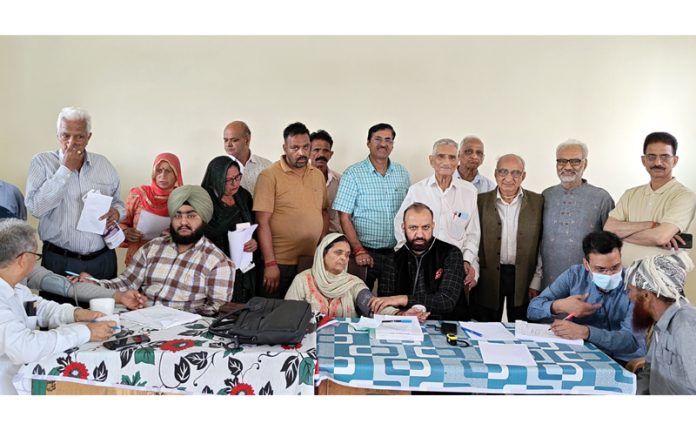Excelsior Correspondent
JAMMU, May 12: While spearheading his campaign towards the prevention of cardiac ailments, Head Department of Cardiology GMCH Jammu Dr Sushil Sharma held a day long cardiac awareness-cum- health check up camp at Hari Prabhu Sanstha, Nagrota Gujroo area of Billawar district, Kathua with main focus on enlightening rural masses about the increasing prevalence of hypertension and thereby contributing to the already overburdened healthcare systems and henceforth increasing both morbidity and mortality. More than 250 people were screened, evaluated, diagnosed for various health ailments. Blood Sugar, ECG and Eye Sight tests were done and free medicine were also given as per the requirements.
While interacting with the people, Dr Sushil stated that Non-Communicable Diseases (NCDs) such as heart diseases, stroke, diabetes, cancer and chronic respiratory diseases are the leading causes for morbidity and mortality worldwide, with three-fourth of deaths occurring in the low and middle-income countries after the age of 60. Among them, hypertension is the leading cause of mortality and is ranked third as the risk factor of healthy years of life lost due to morbidity or pre-mature death. Hypertension is a major risk factor for cardiovascular diseases (CVD), particularly ischemic heart disease and stroke. In the recent years, the burden of hypertension has increased.
More than 35% of the adult population is affected by hypertension in the Asian region thereby becoming a serious public health concern.
He elaborated that socio-economic and lifestyle factors seemed to contribute significantly to the urban-rural gap in undiagnosed, untreated and undertreated hypertension in India among older adults. “There is an urgent need of creating awareness programmes for the early identification of hypertensive cases and regular treatment, particularly in under-serviced rural India. Interventions should be made targeting specific population groups to tackle inequality in healthcare utilization. That although awareness and treatment rates of hypertension have significantly improved in recent years, prevalence of undiagnosed and untreated hypertension still remains a major public health issue plaguing the developing societies. The low- and middle-income countries have a higher rate of undiagnosed, uncontrolled and untreated hypertension than in the developed countries. Lack of knowledge, detection and treatment of hypertension contribute to higher risk of stroke, younger age of onset and larger proportion of intracerebral haemorrhage in lower-income countries,” Dr Sharma said.
Others who were part of this camp include Dr Yashwant Sharma and Dr Ankur Goel (Ophthalmologist). Paramedics and Volunteers include Rajkumar, Ranjeet Thakur, Vishal Padha, Nirvair Singh Bali, Rajinder Singh, Rahul Vaid, Rohit Nayyar, Paramveer Singh and Vikas Kumar.


